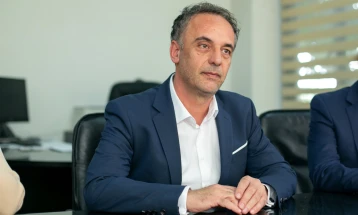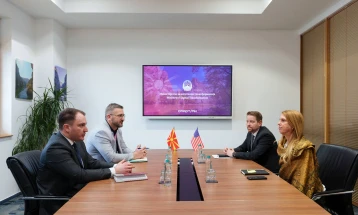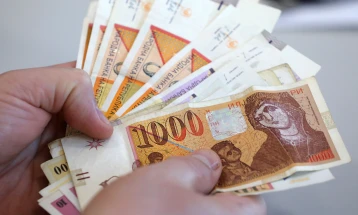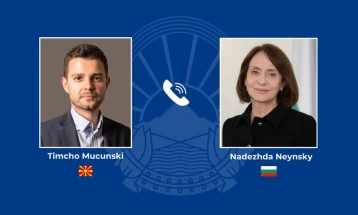Research in indoor air pollution in schools and kindergartens: WHO recommendations exceeded by twofold on average
- A research on indoor air quality in public schools and kindergartens conducted in five municipalities, including Gostivar, Struga, Kumanovo, Strumica and Kavadarci, shows a problem similar with ambient air, because allowed limit of suspended solid particles is exceeded, but other polluters, such as gas and bioaerosols, are within limits. Unlike outdoor pollution, there are several ways to tackle indoor air pollution.
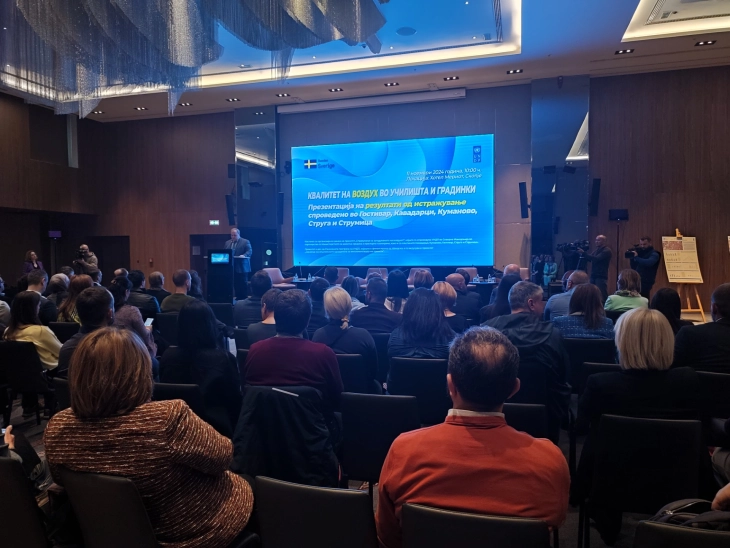
Skopje, 11 November 2024 (MIA) – A research on indoor air quality in public schools and kindergartens conducted in five municipalities, including Gostivar, Struga, Kumanovo, Strumica and Kavadarci, shows a problem similar with ambient air, because allowed limit of suspended solid particles is exceeded, but other polluters, such as gas and bioaerosols, are within limits. Unlike outdoor pollution, there are several ways to tackle indoor air pollution.
The research is part of a project on tackling air pollution in the five municipalities, implemented by UNDP with funds from Sweden. Presenting the findings, Shtip University professor Dejan Mirakovski said air quality in premises where preschool and school children are staying was analysed according to a World Health Organization (WHO) methodology in less than a year.
In general, he said speaking to members of the media, there is no direct connection of outdoor and indoor air and in winter, high air pollution is recorded, there is no breakthrough in indoor air because of improved isolation of premises, which are primarily energy efficient. He noted that there is less concentration of particles recorded during the winter indoors compared to the summer period, when the concentration of harmful particles is higher indoors than outdoors.

“On average, we almost exceed WHO recommendations by twofold, which is why it is necessary to take measures ensuring that conditions in schools and kindergartens are healthy and safe for children and teachers. In general, we breathe polluted air both indoors and outdoors with indoor air presenting a bigger problem for us because we spend most of our time indoors than outdoors especially during the winter,” stated Mirakovski.
Unlike outdoor air pollution, there are several solutions to indoor air pollution – from modern ventilation systems to simple single air filtration systems that can reduce suspended particle concentration by 80%-90%.
According to Swedish Ambassador Ami Larsson Jain and UNDP Resident Representative Armen Grigoryan, findings from the research will help the five cities tackle the problem.
“We believe every step on this path builds the driving momentum to making changes. We thank the municipalities of Kavadarci, Strumica, Gostivar, Kumanovo and Struga for co-financing planned investments amounting to almost one million euros,” said the Ambassador.
Air pollution affects health and workplace productivity, stated Grigoryan.
Our initiative so far, he said, has been taking place in six municipalities where indoor and outdoor air quality was tested and we’re open for cooperation with other municipalities and state central bodies.
As regards tackling air pollution, Health Minister Arben Taravari said the government has approved a project of the ministry that should be launched by the end of next year.

“It involves 10 hospitals in which standard mazut and oil heating will be replaced and other heating options will be included that doesn’t pollute air. The government is participating, but non-governmental organizations are also donating. I believe the project will help a lot,” said Taravari.
According to Education Minister Vesna Janevska, air quality is of utmost importance, especially in schools because it affects the psychological and physical development of students all the while affecting teachers, too.
“The state has to make efforts to improve the conditions for living and working overall, including in schools. To that end, we will make schools energy efficient to reduce carbon dioxide emissions. We’re also focused on changing the heating systems, but we’ll also increase education on protecting the environment,” stated Janevska.
Gjoko Velkovski, Deputy Minister of Social Policy, Demographics and Youth, said it is an alarming issue because the number of children with lung and respiratory diseases is rising.
“We need to join forces and make a plan to curb polluted air first and foremost for the young ones,” he said.
The Ministry of Social Policy, he added, secures block grants to local authorities to buy air filtration systems for kindergartens.
Photo/video: MIA


